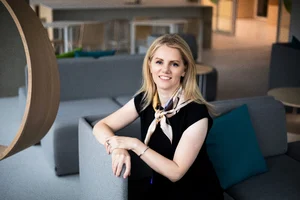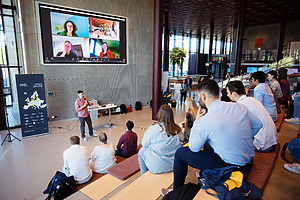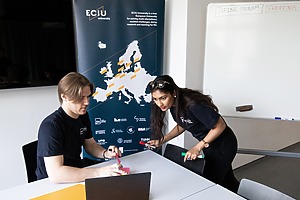According to her, it’s a very different approach, but that’s exactly what both teachers and students appreciate about it.
There has been an entire ecosystem developed at the Kaunas University of Technology to adapt to this new perspective. It is included in study programmes, used in extracurricular courses, and embedded into the teachers’ training. This way, it will be easier for learners to obtain new skills that respond to their career goals and offer solutions to challenges that may await them after graduation.
That’s far from all the things that have changed. The flexible learning pathways model that allows students to personalise their learning experience was adapted for the university’s goals. It is being implemented in ten study programmes already – with the first five study programmes set to offer a small-scale flexible learning pathway as early as 2024.
Micro-modules – shorter courses that help learners fill the knowledge gaps and gain competencies relevant to participating in the learning opportunities – are also gaining momentum. This academic year, 29 learning opportunities with 1 to 3 credits for both KTU and ECIU University learners are taking place.
The impact can be seen on all levels – even the KTU infrastructure is changing, as a new CBL co-creation area with a high level of digitalisation dedicated to challenge-based learning was established.
Even more changes to come
Of course, it’s inevitable to face challenges when implementing such changes. Among the few KTU vice-rector names, are managing the teachers’ workload, which is usually higher than with standard study modules, and developing a system for the motivation and recognition of their efforts. The university is also still looking for the best way to engage stakeholders in challenges and help learners choose from the huge pool of new opportunities. But even with all the questions which are yet to be answered, there’s no doubt the effort is worth it – and the community’s response is the proof.
“The students are reacting well to the changes,” Kristina Ukvalbergienė says. “The number of students participating in the learning opportunities is constantly growing. They see the value, they want to engage in challenges and modules, they aspire to become ECIU University ambassadors. They really enjoy it.”
KTU students get to study and collaborate in an international environment, discovering more about teamwork, problem-solving, self-management and much more.
“We can now offer them more mobility and flexibility in studies, as well as provide them with a bigger choice of learning opportunities. Through challenge-based learning, we help students develop life skills. This way, we can better prepare them for the future.”
And while ECIU University priorities are already changing Kaunas University of Technology’s educational landscape, even more is planned, Kristina Ukvalbergienė shares. Moving forward, the university aims to prioritise life-long learning in a way that benefits both the university and the alliance – providing learners with broad and diverse opportunities on each stage of their learning path.
It also hopes to offer more flexibility opportunities to learners and include new micro-modules focused on developing specific competencies – like artificial intelligence or data analytics – into the curriculum. The recognition system may undergo changes as well; while KTU already recognises ECIU University credits, there are discussions to introduce its micro-credential system on the national and local levels.
And, of course, KTU will continue implementing challenge-based learning further into its system, with several new programmes starting this year and more planned for the next one.
The world is changing – and so should universities
As KTU adopts innovative approaches, it also brings its own knowledge and good practices to the table – contributing to its partners and alliance’s goal. To inspire innovation and foster a global impact.
It is especially important today, Kristina Ukvalbergienė points out. As the world changes rapidly, so does the educational environment, and so should the educational institutions – adapting to the new challenges and helping develop new knowledge that will allow students to thrive in this reality.
“No matter the challenges, it’s important to keep up what we’re doing,’ she says. ‘The landscape is changing quickly. It’s changing so much that some people may even wonder if they need universities. But being part of ECIU University is our opportunity to answer this question.”
She believes that this way we can change the discourse, reform, develop new, relevant competencies and quickly adapt to the demands of tomorrow.
Author: Anastasiya Bukhtiarova




